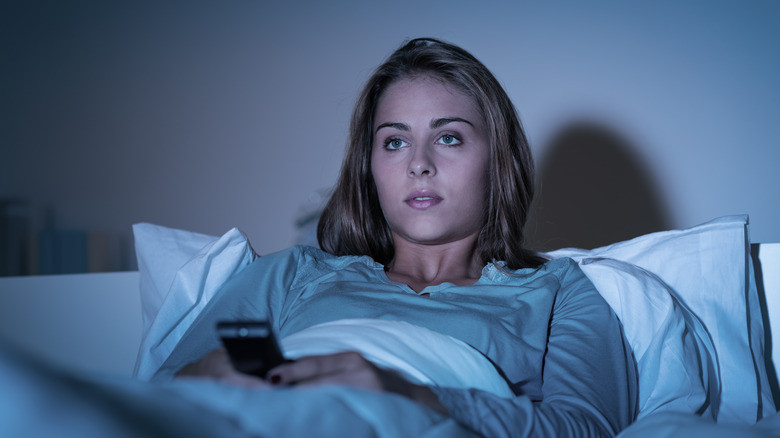Whether it’s binge-watching our favorite series or staying up for the last out of the ballgame, many of us tend to keep our bedroom televisions on well into the night. Having a TV in the bedroom is becoming more and more common, in fact, with the National Sleep Foundation reporting that more than 70% of people currently have one. And, in addition to using the TV for entertainment before bed, a 2024 report in Behavioral Sleep Medicine revealed that more than 30% of people use television as a sleep aid.
While it may seem harmless to drift off with your favorite show playing in the background, you could actually be doing more harm than good. Northwestern University reported that exposure to even a moderate amount of light during sleep could impair cardiovascular function and raise your insulin resistance. Additionally, a 2024 study published in JAMA Pediatrics showed a link between having a television in the bedroom and childhood obesity. So, if you opt to use your TV as a nightlight, here are a few things you could expect to happen.
Your sleep debt will increase

According to the Mayo Clinic, the average adult needs seven or more hours of sleep per night. If you keep the TV on too long at night, you can begin to eat into the amount of sleep you need and, as a result, develop what is known as a sleep debt. A sleep debt is the difference between how much sleep you need and how much you actually get (via the Sleep Foundation).
The National Heart, Lung, and Blood Institute notes that accumulating sleep debt can lead to a wide array of health problems. These include an increased risk of developing diabetes, hypertension, heart disease, and stroke. In addition, by not getting a proper night’s rest, your risk of injuring yourself during the day goes up. Sleep debt has been linked to injuries from car accidents, as well as falls and broken bones in older adults.
Your melatonin levels can go down
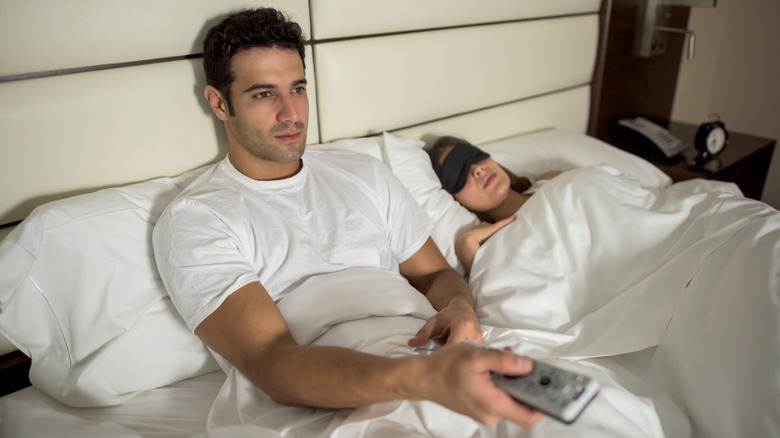
The light emitted by your television is known as blue light, and it can be pretty detrimental to your sleep, according to the Sleep Foundation. In particular, blue light can disrupt your circadian rhythm, the sleep-wake cycle in your body. According to a 2003 study published in the Journal of Endocrinology and Metabolism, exposure to blue light can cause the production of melatonin, a hormone that makes you sleepy, to be suppressed. As a result, your brain may not think it’s nighttime, even though you’re in bed.
According to Harvard Medical School, in studies in which patients were exposed to both blue light and green light, those exposed to blue light saw their melatonin levels remain decreased for twice as long. Additionally, a 2024 study published in Frontiers in Physiology showed that one fifth of the people exposed to blue light showed a decrease in the quality of their sleep, and a third showed that the duration of their sleep was decreased as well.
Your brain can’t relax
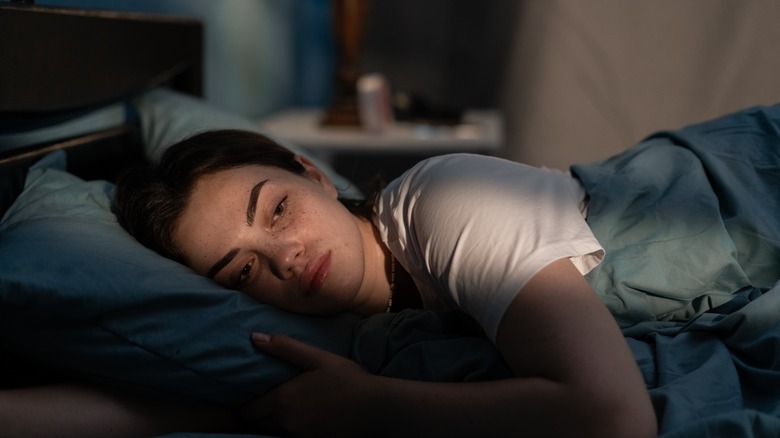
Lysenko Andrii/Shutterstock
Watching TV, whether it’s a sitcom or a football game, stimulates your brain. The music, sounds, and lights all work together to keep your mind active and make it hard for you to settle down. A 2024 study conducted by scientists in Bergen, Norway showed that adolescents who used electronic devices like smartphones and television before bed experienced shorter sleep duration, took longer to fall asleep, and slept more restlessly. Part of that, according to the study, may come from the stimulation caused by the content being viewed.
According to the Anchorage Sleep Center, leaving the TV on while you’re sleeping can be disruptive to your sleep. Even when you’re unconscious, the sounds emanating from your television are still filtering into your brain. In addition, the images you consume before falling asleep can still influence you after you’re out. A 2024 study published in the journal Dreaming showed that people who consumed violent media before bed tended to have violent dreams, and those who viewed media with sexual content often had sexually charged dreams. As a result, the study concluded that media can influence our minds even when we are asleep.
Your weight can be affected

Stockplanets/Getty Images
As troubling as it may sound, something as seemingly harmless as leaving the TV on while you catch some Z’s could be causing you to put on some unwanted pounds. A 2025 study published in JAMA Internal Medicine showed that women who slept with some form of artificial light, including a television, were at an increased risk for obesity. The study noted that women who sleep with an artificial light source could see an increase of 10% or more in their body mass index and were 30% more likely to become obese.
The association between nighttime light and obesity is corroborated by a 2024 study published in the journal Sleep. That study showed that people who slept with light at night were more than 40% more likely to develop obesity than those who did not. There are a few factors at work that could be contributing to this outcome, according to the study. These include light’s impact on our circadian clock, which can in turn alter metabolic function. Secondly, the effect light has on melatonin production could be a factor. In addition to regulating sleep, melatonin also has some antioxidant and anti-inflammatory properties, which could be impacted by disruptions in melatonin production.
Your risk for hypertension can go up

Skynesher/Getty Images
According to the Mayo Clinic, the less sleep you get, the more your blood pressure can rise. This may be due to a hormonal imbalance caused by sleeping less, or it could be caused by such conditions as sleep apnea, which can cause hypertension and other problems with your heart. Additionally, a 2024 study published in the American Journal of Hypertension showed that blood pressure can drop an average of 10% to 20% during sleep, and that a lack of sleep could directly impact blood pressure levels, particularly in young and middle-aged adults.
In addition, television use in and of itself also carries with it the risk of developing high blood pressure. A 2007 study published in the American Journal of Preventative Medicine revealed that children who watched four or more hours of television daily were three times more likely to develop hypertension in adulthood than those who were not. Additionally, a 2013 study published in the International Journal of Behavioral Nutrition and Physical Activity showed that excessive television viewing, more than even other electronic devices, was linked to higher systolic blood pressure and higher cholesterol.
It could affect your mental health
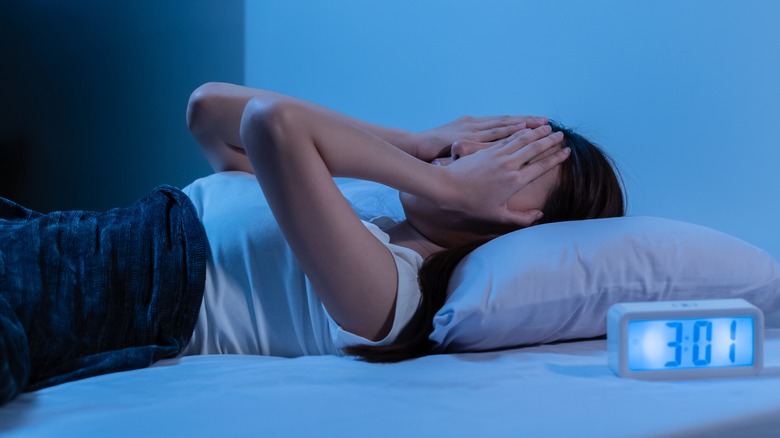
Kmpzzz/Shutterstock
Repeated exposure to the light emanating from your TV at night could alter your brain, as supported by a 2010 study conducted by researchers at Ohio State University. In the study, researchers exposed a group of hamsters to dim light during their sleep cycles for a period of eight weeks. During that time, the hamsters began to show changes in the hippocampus and began to exhibit symptoms of depression, such as refusing sugar water. This study matched the results of a similar study conducted years earlier by the same researchers, which showed that mice exposed to low levels of nighttime light also experienced depressive symptoms.
Similarly, a 2024 study published by Cureus showed that overexposure to devices like smartphones, laptops, and televisions is linked to negative impacts on psychological health. In particular, the study pointed to nighttime screen usage as a potential driver for depression and suicidal thoughts among adolescents. Another 2024 study published in Psychology Research and Behavior Management showed that binge-watching television intensified feelings of stress, depression, anxiety, and insomnia.
If you or someone you know needs help with mental health, please contact the Crisis Text Line by texting HOME to 741741, call the National Alliance on Mental Illness helpline at 1-800-950-NAMI (6264), or visit the National Institute of Mental Health website.
Your REM cycle is disrupted
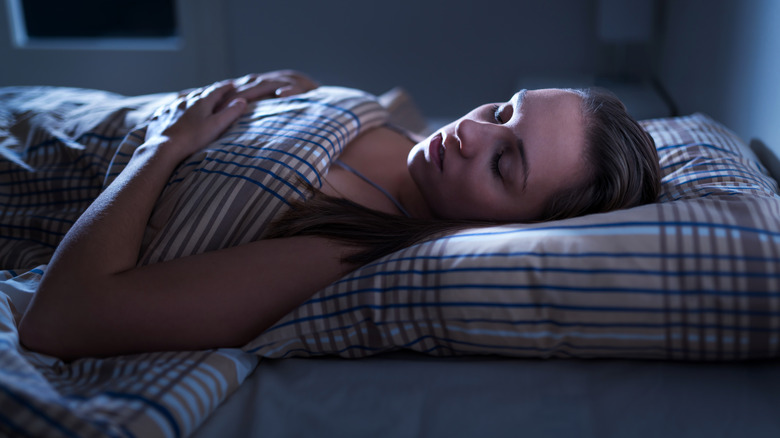
Tero Vesalainen/Shutterstock
Occurring approximately one hour into our sleep time, rapid eye movement (REM) sleep is important for consolidating memories, processing emotions, and the development of the brain (via the Sleep Foundation). REM sleep is also where most of our most vivid dreams occur. According to a 2012 study published in Frontiers in Behavioral Neurosciences, deprivation of REM sleep played a role in regulating emotions and memory properly.
The light emitted by electronics, including televisions, can interfere with our being able to successfully reach the REM stage of sleep, as reported by a 2024 study published in PNAS. In that study, patients who used electronics before bed took ten minutes longer to fall asleep than those who didn’t. Once they fell asleep, they also experienced far less rapid eye movement. In addition, our brains continue to process information even after we have fallen asleep, as reported by a 2024 study published in Current Biology. Because of this, sounds, music, and dialogue coming from the TV may cause our brains to react, keeping us from falling into a deeper, more restful sleep.
It could reduce stress
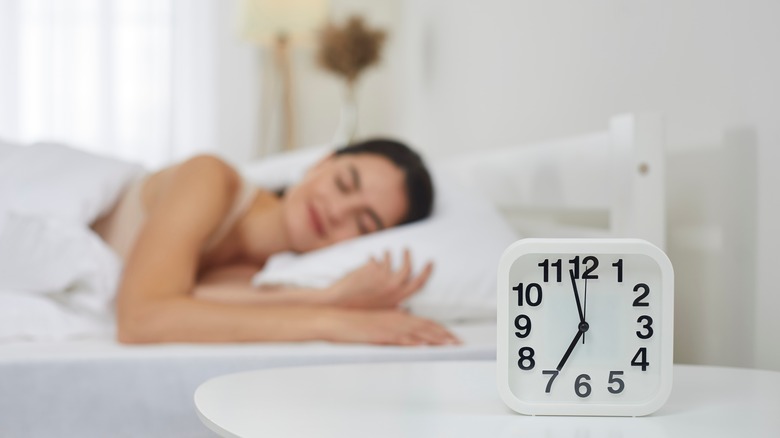
Studio Romantic/Shutterstock
In the pro column, falling asleep to a favorite sitcom or movie could be a great way to unwind and ease tension after a long day. A 2012 study published in Social Psychological and Personality Science revealed that, for people who feel out of control, visiting fictional worlds can be a way to restore a sense of self-control and bring about peace of mind. Additionally, the familiarity of a beloved show or film can be calming, letting us know what to expect and removing uncertainty, all of which can promote relaxation (via Deakin University).
The link between TV-watching and reduced stress is further supported by a 2024 study published in Health Communication, which showed that the more TV the people who took part watched, the lower their levels of the stress hormone cortisol were. Television, it turns out, is a fairly common source of stress relief for most Americans. A survey conducted by Marketing Charts showed that nearly half of Americans turn to TV or streaming as a way to ease tension. However, only 17% said that they watch current events or news, preferring to watch comedy or light-hearted shows to take their minds off of their troubles.
White noise could help you sleep
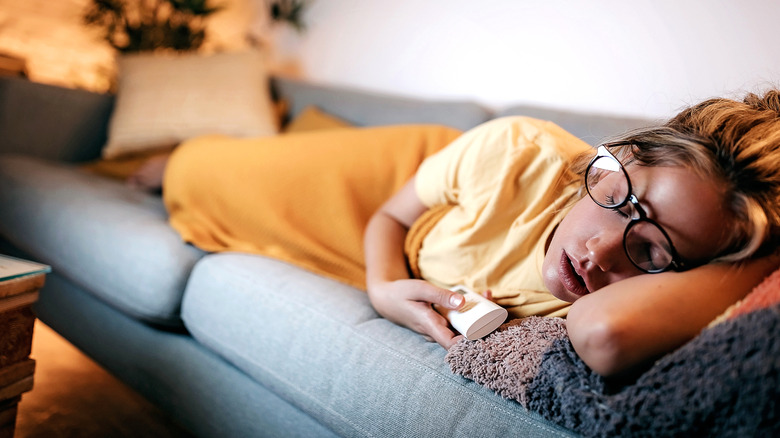
Stefanikolic/Getty Images
For some people, sleeping with some kind of noise in the background can be a good way to relax and drift off. A 2008 study published in the Journal of Advanced Nursing showed that listening to classical music at bedtime improved sleep quality significantly. Additionally, a 2024 survey conducted and published by PLoS One showed that 62% of people used music to help them get to sleep.
One argument for keeping the TV on while going to sleep is something known as autonomous sensory meridian response (ASMR). According to the Sleep Foundation, this is a pleasant tingling sensation and feeling of relaxation across the scalp, neck, and shoulders. It can be triggered by a number of things, including certain sounds like whispering, tapping, page turning, and typing (via Healthline). Because of this, a number of videos featuring ASMR-inducing sounds from movies and TV shows have become very popular on YouTube. Using ASMR as a means of getting to sleep has been effective enough that, in a 2024 study published in the International Journal of Environmental Research and Public Health, students profiled compared ASMR to taking a sleeping pill. So, while leaving the TV on may not be for everyone, there is evidence to suggest that it could be helpful in some cases.

